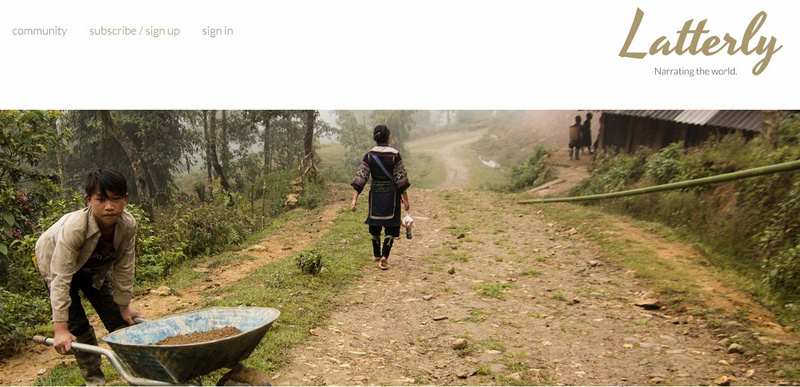Travel Reading Recommendation: Interview with Latterly
I discovered Latterly Magazine last year, not long before they launched their first issue. While not exactly your usual travel reading, Latterly is a digital publication that focuses on international journalism, covering meaningful, in-depth stories based around some of the most important issues of our time, and the people and places involved.
I have to admit, I’m not great when it comes to current affairs. I couldn’t tell you the ins-and-outs of the political situations in the Middle East, Russia or North Korea. Not because I’m uninterested, but because I find it hard to get past the jargon and underlying motives of a news story. I need individual accounts, and I need to understand a place and its situation through the people who live there. For me, that’s where Latterly stepped in.

Not only does Latterly tell these important stories from a fresh perspective, it’s also subscription based and therefore ad-free. A monthly subscription is $3, quarterly is $8 – seriously affordable. I consider it my Netflix for news.
So I decided to chat to co-founder Ben Wolford about all-things Latterly, and what publications like this mean for the future of news and travel journalism.
How did Latterly begin?
Spontaneously. My wife and I were living in Bangkok. I had some spare money for the first time ever and a job that only needed me five hours a day. We’d been living in New York, so this was a bit liberating. We had time to think and be creative. One Friday we were talking about starting a digital magazine with a model similar to The Magazine (dead) or Compass Cultura (very much alive). Christie went to work, and I told her when she came back the website would be up. Six hours later I had a name, a logo and a Squarespace site. We’ve since developed a real website and an iOS app through PressRoom, raised $12,000 on Kickstarter and put out our seventh issue this week.
What kind of stories does Latterly focus on?
This is a magazine that instantly appeals to people who travel and who’ve spent time outside their own countries. Those readers automatically get it. I don’t need to try very hard. But when I’m deciding whether a pitch should be a Latterly story, I’m thinking about everybody else — the people who’ve never left home, the people who don’t know what’s out there. I want these stories to be so human and so compelling that it doesn’t take a whole lot of imagination to sympathize with the characters. In other words, even if our story is set in Laos or Western Sahara, the emotional topics of the piece — bravery, loss, etc. — should resonate even with Uncle Joe in Alabama who knows all the lyrics to “God Bless America.”
What’s been your favourite feature to date?
This is a little like choosing a favourite child. “Stolen to China,” in the current issue, is an astounding piece of journalism. Despite language and cultural barriers, the author unearthed this human trafficking phenomenon that’s not being talked about. Men are kidnapping ethnic minorities in Vietnam and selling them to husbands and brothels in China. And if that wasn’t compelling enough, he learned that an organization called Blue Dragon is running vigilante missions into the interior of China to rescue them. They’ve saved hundreds of women.

Photo from Latterly feature Stolen to China
Why do you think publications like Latterly matter?
All of our blockbuster stories tend to be emotionally layered and globally significant in the way “Stolen to China” is. “The Messenger of God” pulls back the curtain on gurus in India. “The Gravedigger of Kabul” asks what kind of dignity we owe to terrorists. “Edge of Evil” gives us in relative safety a way to relate with people living in range of the Islamic State.
A news article and a story aren’t necessarily the same thing. News writing doesn’t help us to understand in the way storytelling does. That’s not a slam on the journalists going into harm’s way to cover important events. But it is a critique of the way news organizations shape their coverage.
Which is the point I want to make: What if we took a small focus off of the day’s disaster and instead spent some time with foreign subjects in a state of normalcy. Wouldn’t that give readers a better understanding of what counts for abnormal? Show us the crowded market on a regular day so that when a bomb goes off there we appreciate the terror of such a thing. That’s essentially what travel does for us, isn’t it? We go into some strange place, and we come away with a sense of its pace and history. Then if a news story happens there, we gobble it up; we suddenly care more. That’s what I hope Latterly does — via iPhone app.
Are there any stories you’ve not yet featured in Latterly that you’re keen to include?
I’m trying to get to every continent. We don’t have Australia yet. And I’m not too hopeful about Antarctica. I also want to get inside places we have trouble understanding, particularly Russia, China, Iran and North Korea. Reporting from these places isn’t so easy, especially the latter two, and coverage rarely focuses on regular people who live there. We need more Latterly-style reporting from the places that matter most to foreign policy.
What do you see for the future of Latterly?
I’m actually in the middle of recruiting hundreds of correspondents from every country in the world for a project that may or may not work. (Email me if anybody’s interested.) I don’t want to spell out details just yet, but I want to do a better job of portraying daily life in foreign places. I’ve brought on a senior editor, and I’m looking for one or two more to help with story editing and digital marketing. I’m seeking funds for the project, so that’s going to determine how ambitious we can be. But the most important thing is that Latterly is valuable to people, and I think making it a platform for global engagement is a way to create that value.
Exclusive subscription offer! Ben has kindly given Gotta Keep Movin’ readers a month’s free subscription to Latterly – just use coupon code KEEPMOVE at checkout to redeem the offer.


Leave a Reply